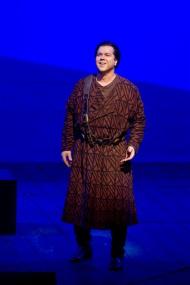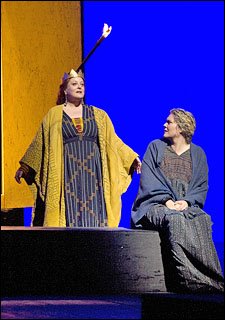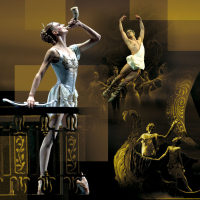

The current run of Tristan und Isolde at the Met has had more than its share of high drama, and not always the desirable kind. It all began with the indisposition of Canadian tenor Ben Heppner. This was supposed to be the much anticipated reprise of his Tristan, one of his most celebrated roles. And he was paired with soprano Deborah Voigt in her first Met Isolde. With these two great singers, supported by Wagnerian luminaries Matti Salminen and Michelle DeYoung, it was a highly anticipated event.
But things did not go smoothly from the start in this ill-starred revival. Heppner was feeling unwell throughout the rehearsal period, suffering from chills and fever. Doctors in New York misdiagnosed it as a "simple" case of virus. According to news report, he flew back to Toronto to undergo tests at the North York General Hospital. He was subsequently diagnosed as having a blood-borne infection that has abscessed in his pelvic region, requiring heavy doses of antibiotics and a surgical procedure to drain the infection. Heppner is still scheduled for the remaining two performances this coming week, although the chance of his singing is unknown. He was replaced in the orchestra rehearsal and the final dress by another Canadian, tenor John Mac Master, who was picked to sing opening night. I heard the broadcast on Sirius Radio. Reportedly suffering from allergies, Mac Master struggled in the middle and lower parts his voice, particularly during the lengthy Act 2 Love Duet. He was able to summon sufficient resources and sang an honorable Act 3. In the end, he had to face, undeservedly, boos from a few members of the Met audience at the final curtain. However, it should be noted that the second solo curtain call, he was met with only cheers.
Given the unfortunate reception for Mac Master, the Met management felt it necessary to find another cover. American tenor Gary Lehman, who has had Wagner experiences but had not sung Tristan previously, was quickly pressed into service. He sang the second performance and was well received by the audience. Like a comedy of errors, it was Voigt's turn to get sick. She walked off the stage during the Act 2 Love Duet due to stomach upset. The curtain came down the the performance resumed shortly with her cover, American soprano Janice Baird. Baird is a well known Wagnerian in Europe and is scheduled to sing Brunnhilde for Seattle in summer 2009. Both leads had a success in the second performance, but the drama didn't end there. The staging of the opening of Act 3 has Tristan prostrate on a raked stage with his head pointed downstage. In the third performance, a malfunction of the stage machinery sent Lehman into the prompter's box, close to the open flame which was part of the staging. The performance came to a grinding halt. Lehman was not hurt and the performance resumed in about 8 minutes with no further incident, thankfully.
With the string of mishaps, the fourth performance yesterday, telecast in movie theatres worldwide, understandably put the production team and the more knowledgeable members of the audience on edge. I am happy to report that everything came together and the result was a terrific performance witnessed by a large international audience. Deborah Voigt appears to have regained a few pounds of the huge amount of weight she had lost. While not everyone agrees that weight and voice have any direct relationship, all I can say is that in her case, she sounds better than she has been since her gastric bypass surgery two years ago. For my money, her modest weight gain now may well have contributed to her improved vocal estate and overall stamina in this punishing role. The voice is better supported, and the top firmer and less shrill. The first of her two high Cs in the beginning of the love duet was particularly strong. Throughout the opera, she sang with gleaming tone, in crystal clear German (unlike the mushy German of Michelle DeYoung, the Brangaene), only tiring during the Liebestod. That last ten minutes found her struggling with flat intonation, particularly near the end, when she fought hard to stay on pitch and largely not succeeding. This is forgivable given the overall quality of her performance. Her acting was more involved than I had previously experienced. She was partnered by American tenor Robert Dean Smith, who has a notable career in Europe, including Bayreuth, in the heldentenor fach. Scheduled to make his Met debut as the Kaiser in Die Frau ohne Schatten in 2009, this performance marked his unscheduled debut, and it was an auspicious one. His Tristan combined beauty of tone with impressive stamina, unflagging in his vocalism throughout the lengthy delirium scene in Act 3. His acting was less interesting, but given he had no rehearsal, it was understandable.
The rest of the cast was strong. Eike Wilm Schulte sang firmly as Kurwenal; Michelle DeYoung an unusually youthful Brangaene, more sisterly than matronly. She started tentatively and sounded underpowered, but quickly warmed up to give an estimable performance. And it was a pleasure to hear the magnificent "black bass" of Matti Salminen as King Marke. It appears age is finally catching up with this great singer, evidenced by an incipient slow vibrato that has crept into his voice. But he is still head and shoulders above the others. James Levine has been much praised in Wagner and for good reason - his conducting has all the power and sweep one has come to expect and he managed to make the five and a half hour opera go by in a flash.
Now to the production itself. I saw this in the house some years ago with Heppner and Eaglen; and that run was subsequenly telecast and released on DVD. I have to say I am not too fond of the Dieter Dorn-Jurgen Rose production, which I find idiosyncratic and visually unsuited to the video camera. With this new attempt which draws upon new HD technology, some of my original complaints have been dispelled. Canadian Barbara Sweete, hired by Peter Gelb to do the telecast, liberally employed split screens and multiple images. It has the effect of creating movement in the opera where there is none. Remember we are dealing with an essentially static work, accentuated by a minimalist, highly formalized production. Sweete succeeded in introducing a certain visual variety. When the multiple images first appeared in Act One, I found the effect striking. But by Act Two, its frequency had increased to such an extent that it was almost distracting - a case of too much of a good thing perhaps. Unlike others who have commented negatively on this, I *liked* the concept of multiple images when it is used judiciously, and in a way that does not impede the drama and the overall context of the piece. Given this technique is still in the experimental stage at the Met, some of these issues will likely be resolved out in future telecasts. On this occasion, there were breathtakingly beautiful moments throughout - particularly memorable was the closeup of the two lovers on a dimly lit stage during a quiet moment near the end of the love duet. Moments like that are simply not accessible to the audience in the theatre, no matter how powerful the opera glass! In the theatre when I last saw the production, the two lovers were seen in silhouette, given the back-lit stage. There was simply no visual nuance possible. In fact, one critic (who shall remain nameless) made the nasty remark that the silhouettes of Heppner and Eaglen looked like two large sacks of garden leaves! What I am driving at is that this production poses special challenges for the live audience and the TV camera. Given the constraints, I thought the videography of this telecast was superb.
Technically, this performance as seen at Cinema 6 at the Sheppard Grande represented the first time that the satellite transmission was flawless - no frozen picture, no distorted sound, just five and a half hours of pure enjoyment. If I were to quibble, strangely the sound in Act 3 was much louder than Acts 1 and 2, and near the upper limit of human tolerance. Other than that, I have no complaints. So kudos to the Met and Sheppard Grande. Let's hope this continues!
Labels: Deborah Voigt, HD, Met Opera, Robert Dean Smith, Sheppard Grande, Tristan und Isolde






